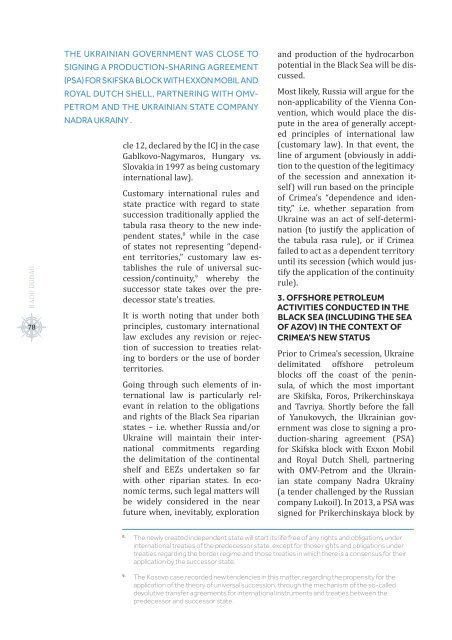Create successful ePaper yourself
Turn your PDF publications into a flip-book with our unique Google optimized e-Paper software.
RADU DUDAU<br />
78<br />
THE UKRAINIAN GOVERNMENT WAS CLOSE TO<br />
SIGNING A PRODUCTION-SHARING AGREEMENT<br />
(PSA) FOR SKIFSKA BLOCK WITH EXXON MOBIL AND<br />
ROYAL DUTCH SHELL, PARTNERING WITH OMV-<br />
PETROM AND THE UKRAINIAN STATE COMPANY<br />
NADRA UKRAINY .<br />
cle 12, declared by the ICJ in the case<br />
Gablkovo-Nagymaros, Hungary vs.<br />
Slovakia in 1997 as being customary<br />
international law).<br />
Customary international rules and<br />
state practice with regard to state<br />
succession traditionally applied the<br />
tabula rasa theory to the new independent<br />
states, 8 while in the case<br />
of states not representing “dependent<br />
territories,” customary law establishes<br />
the rule of universal succession/continuity,<br />
9 whereby the<br />
successor state takes over the predecessor<br />
state’s treaties.<br />
It is worth noting that under both<br />
principles, customary international<br />
law excludes any revision or rejection<br />
of succession to treaties relating<br />
to borders or the use of border<br />
territories.<br />
Going through such elements of international<br />
law is particularly relevant<br />
in relation to the obligations<br />
and rights of the Black Sea riparian<br />
states – i.e. whether Russia and/or<br />
Ukraine will maintain their international<br />
commitments regarding<br />
the delimitation of the continental<br />
shelf and EEZs undertaken so far<br />
with other riparian states. In economic<br />
terms, such legal matters will<br />
be widely considered in the near<br />
future when, inevitably, exploration<br />
and production of the hydrocarbon<br />
potential in the Black Sea will be discussed.<br />
Most likely, Russia will argue for the<br />
non-applicability of the Vienna Convention,<br />
which would place the dispute<br />
in the area of generally accepted<br />
principles of international law<br />
(customary law). In that event, the<br />
line of argument (obviously in addition<br />
to the question of the legitimacy<br />
of the secession and annexation itself)<br />
will run based on the principle<br />
of Crimea’s “dependence and identity,”<br />
i.e. whether separation from<br />
Ukraine was an act of self-determination<br />
(to justify the application of<br />
the tabula rasa rule), or if Crimea<br />
failed to act as a dependent territory<br />
until its secession (which would justify<br />
the application of the continuity<br />
rule).<br />
3. OFFSHORE PETROLEUM<br />
ACTIVITIES CONDUCTED IN THE<br />
BLACK SEA (INCLUDING THE SEA<br />
OF AZOV) IN THE CONTEXT OF<br />
CRIMEA’S NEW STATUS<br />
Prior to Crimea’s secession, Ukraine<br />
delimitated offshore petroleum<br />
blocks off the coast of the peninsula,<br />
of which the most important<br />
are Skifska, Foros, Prikerchinskaya<br />
and Tavriya. Shortly before the fall<br />
of Yanukovych, the Ukrainian government<br />
was close to signing a production-sharing<br />
agreement (PSA)<br />
for Skifska block with Exxon Mobil<br />
and Royal Dutch Shell, partnering<br />
with OMV-Petrom and the Ukrainian<br />
state company Nadra Ukrainy<br />
(a tender challenged by the Russian<br />
company Lukoil). In 2013, a PSA was<br />
signed for Prikerchinskaya block by<br />
8.<br />
The newly created independent state will start its life free of any rights and obligations under<br />
international treaties of the predecessor state, except for those rights and obligations under<br />
treaties regarding the border regime and those treaties in which there is a consensus for their<br />
application by the successor state.<br />
9.<br />
The Kosovo case recorded new tendencies in this matter, regarding the propensity for the<br />
application of the theory of universal succession, through the mechanism of the so-called<br />
devolutive transfer agreements for international instruments and treaties between the<br />
predecessor and successor state.










